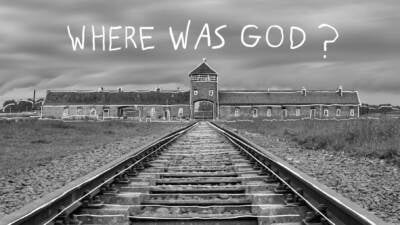What do you think the Jewish theological response to the Holocaust should be?
Jewish Theology and the Holocaust (Topic 3, part 1)
Share
In April 2020, to coincide with Yom HaShoah, the day in the Jewish calendar dedicated to Holocaust remembrance, and the 75th anniversary of the liberation, Rabbi Sacks launched a series of videos offering his perspective on some of the biggest questions asked about the Holocaust.
Speaking personally, the most profound Jewish response to the Holocaust I know is Sefer Eichah, the Book of Lamentations, the book written after the destruction of the First Temple, the poetry of lament, bitter lament unto death. It is one of the most searing pieces of literature ever written. And we said it in memory of the loss of the First and Second Temples, Tisha B’Av, the 9th of Av, on the saddest day of the Jewish year. I know of no more profound theological response. In Judaism the most profound theological response is not an answer. It’s not a theology, it’s a cry.
I heard of a Rabbi who went through the Holocaust, (this is a true story), and lost his wife and all 11 children and was asked afterwards, “Do you have no questions of God?” And he replied, “Of course I have questions of God. My questions of God are so powerful that were I to ask them, God Himself would invite me up to Heaven to give me the answers. And I prefer to be down here on earth with the questions than up there in Heaven with the answers.” Now, that sounds clever, but actually it’s very profound. I have said many times: Faith is not certainty. Faith is the courage to live with uncertainty. After the Holocaust, uncertainty is where we live.

This series, created in partnership with the Holocaust Educational Trust, has been made possible thanks to the generous support of Richard Harris.
More Holocaust Curriculum Resources

Faith After the Holocaust
Rabbi Sacks responds to the devastation of the Holocaust

Where can you find hope in the history of the Holocaust?
Hope and the Holocaust (Topic 10)

How does the Holocaust impact interfaith relations today?
Interfaith Relations and the Holocaust (Topic 9)

How do you connect the Holocaust with the establishment of the State of Israel?
Israel and the Holocaust (Topic 8)

Do you think it’s ever possible to forgive the perpetrators of the Holocaust?
Forgiveness and the Holocaust (Topic 6)

What is the difference between vengeance and justice?
Jewish Theology and the Holocaust (Topic 5, part 3)

What about a statute of limitations?
Just Punishment and the Holocaust (Topic 5, part 2)

A Just Punishment for the Nazis?
Just Punishment and the Holocaust (Topic 5, part 1)

Do you think the Holocaust represented a failure of humanity?
Humanity and the Holocaust (Topic 2, part 1)

Does God care about individual lives, or merely the survival of the Jewish people as a nation?
God and the Holocaust (Topic 1, part 3)

Do you have faith in humanity after the Holocaust?
God and the Holocaust (Topic 1, part 2)

Where was God during the Holocaust?
God and the Holocaust (Topic 1, part 1)

What is theologically unique about the Holocaust?
Jewish Identity and the Holocaust (Topic 7, part 3)

Practically speaking, is there something unique about the Holocaust?
Jewish Identity and the Holocaust (Topic 7, part 2)

Should a Jewish theological response to the Holocaust include issues of justice?
Jewish Theology and the Holocaust (Topic 3, part 2)

Should the Holocaust be a key ingredient of our Jewish identity?
Jewish Identity and the Holocaust (Topic 7, part 1)

How has the Holocaust impacted your personal relationship with God?
Personal Faith and the Holocaust (Topic 4)

How can I have faith that God is within each of us if I mistrust humanity?
Humanity and the Holocaust (Topic 2, part 3)

Can we trust people other than ourselves?
Humanity and the Holocaust (Topic 2, part 2)
